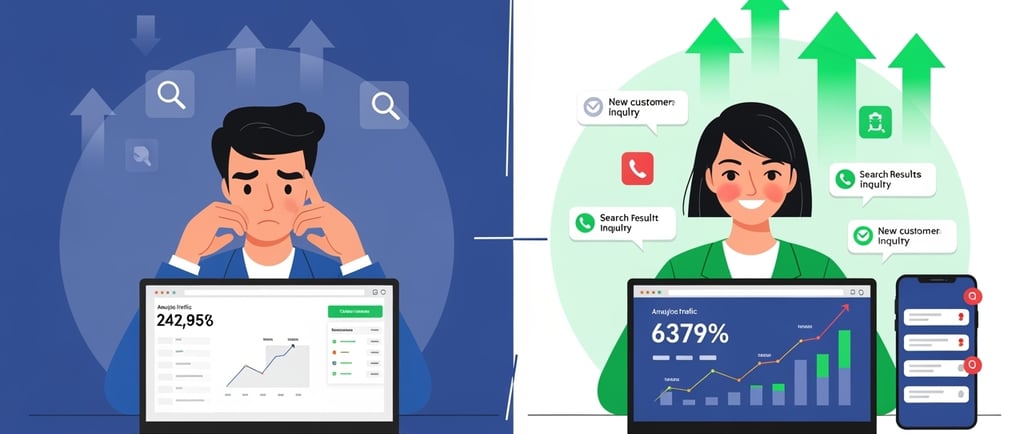Why your small business website isn't getting found (And How to Fix It Fast)
You've invested time and money into building a website for your small business, but there's one problem: nobody's finding it. Sound familiar? You're not alone. Most small business owners launch their websites thinking customers will magically appear, only to discover they're practically invisible online. The good news? You don't need a massive budget or years of experience to turn things around. With a few strategic changes, you can start attracting more local customers within weeks.
9/24/20253 min read


The Real Reason Your Website Is Invisible
Here's the truth most web designers won't tell you: a beautiful website means nothing if search engines can't find it. Google processes over 8.5 billion searches daily, but if your site isn't optimized, you're missing out on potential customers who are actively looking for your services.
The three biggest culprits behind invisible websites:
Missing or weak meta descriptions - These are the snippets that appear under your website title in search results
Poor local SEO setup - Your Google Business Profile isn't optimized for local searches
Slow loading speeds - Google penalizes websites that take forever to load
The 5-Minute SEO quick wins
...That actually work!
Before you panic about needing a complete website overhaul, try these simple fixes that can boost your visibility almost immediately:
1. Write Compelling Meta Descriptions
Think of meta descriptions as your website's elevator pitch. You have 160 characters to convince someone to click on your site instead of your competitor's. Include your main keyword and a clear benefit.
Example: "Custom website design for Wisconsin small businesses. Get a professional online presence that attracts customers and grows your business. Free consultation available."
2. Optimize Your Google Business Profile
This is your secret weapon for local SEO. Make sure your business hours, phone number, and address are accurate. Add high-quality photos of your work, respond to reviews, and post regular updates about your services.
3. Speed Up Your Website
If your website takes more than 3 seconds to load, you're losing customers. Compress your images, choose a reliable hosting provider, and remove unnecessary plugins that slow things down.
4. Create Location-Specific Content
Instead of targeting broad keywords like "web design," focus on local terms like "web design Wisconsin" or "custom websites for small businesses in [your city]." This helps you compete against smaller, more targeted searches.
5. Build Internal Links
Connect your website pages by linking related content together. If you have a blog post about social media marketing, link to your social media services page. This helps search engines understand your site structure and keeps visitors engaged longer.
What Happens When You Get SEO Right
When you implement these changes, here's what you can expect:
More phone calls and emails from potential customers who found you online
Higher search rankings for keywords related to your business
Increased website traffic from people in your local area
Better return on investment from your website and marketing efforts
"I thought my website was fine until I realized nobody could find it. After optimizing for local SEO, I started getting 3-4 new inquiries per week instead of waiting for referrals." - Sarah, Local Restaurant Owner
The biggest SEO mistake small businesses make
Here's where most small business owners go wrong: they try to compete with national companies for broad keywords. A local bakery doesn't need to rank for "birthday cakes" - they need to rank for "birthday cakes near me" or "custom birthday cakes in [city name]."
Focus on local intent keywords like:
"[Your service] near me"
"[Your service] in [your city]"
"Best [your service] [your area]"
"Local [your service] [your city]"
Your Next Steps to Better SEO
Don't let another month go by with an invisible website. Start with these action items today:
Audit your current setup - Check if you have meta descriptions, how fast your site loads, and whether your Google Business Profile is complete
Pick 3-5 local keywords to focus on based on what your customers actually search for
Create one piece of helpful content each week that answers common customer questions
Monitor your progress using Google Analytics and Google Search Console (both free tools)
When to Get Professional Help
While these DIY fixes can make a significant difference, sometimes you need expert guidance to maximize your results. Consider professional SEO help if:
You're too busy running your business to handle SEO consistently
You want faster, more dramatic results
Your competitors are dominating local search results
You need a complete digital marketing strategy, not just quick fixes
Remember, SEO isn't a one-time task - it's an ongoing process that pays dividends over time. The small businesses that invest in their online visibility today will be the ones thriving tomorrow.
Ready to stop being invisible online? Your customers are searching for your services right now. Make sure they can find you.
Growth
Empowering small businesses to thrive online effectively.
Connect
Support
nwoodstudio@gmail.com
920-632-8232
© 2025. All rights reserved.
